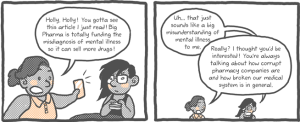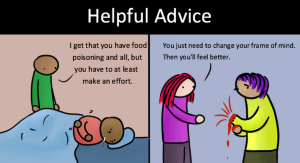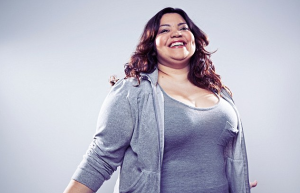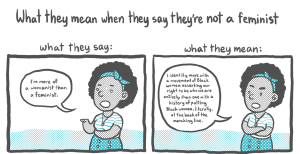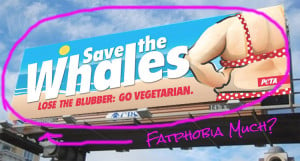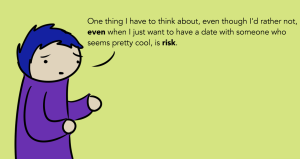Originally published on Adios Barbie and republished here with their permission.

A group of friends toasting at a table covered with plates of food.
As someone who has struggled with food since I was a child, and who suffered from an eating disorder in my teenage years, I’m sometimes sensitive to situations in which food is shared and eaten in groups.
A lot of my family and friends know this, but I’ve still had to sit through more than a few triggering and uncomfortable conversations around the table. Sometimes people just weren’t thinking about what they were saying, and other times I’ve heard comments that are downright offensive.
On the other hand, friends, family, and acquaintances who were food- and body-positive around the table were shining examples for me in recovery.
The way they spoke (and didn’t speak) at meals helped me rewrite how I think about food myself. They helped me understand how people can be allies to those in recovery, and to other people on the journey to peace with food in general.
Inspired by those conversations, here are a few tips for creating a safe and healing environment for your friends, family, loved ones, and other humans to eat in.
1. Don’t Assume That People Don’t Have Food Issues
In fact, assume that they do.
At least 30 million people in the US will have an eating disorder in their lifetime (and due to underreporting, that number is probably low). Millions more suffer from disordered eating and body image issues (here is how those things are different).
And the myth that only straight, thin, white women suffer from these issues, while the LGBTQIA+ community, men, fat people, and women of color are somehow immune? Completely untrue.
Many people assume that only thin, wealthier white women have issues with food, or that certain cultures don’t have the “food issues” that Western culture does.
But anyone can have an eating disorder or struggle with their relationship with food. Don’t let another person’s culture or background allow you to assume otherwise.
Additionally, don’t let assumptions that people don’t have food issues allow you to say triggering things. “Anorexic” and “bulimic” aren’t funny names to call people in regards to their eating habits. They are serious mental health issues that shouldn’t be taken lightly, and can be really triggering for those suffering from eating issues.
2. Avoid Moralistic Discussions of Food
This is my biggest all-time favorite tip, and probably the most difficult rule to follow, even for me.
“This is so bad!” should be reserved for when something actually tastes so bad. I’ve heard “we are being so bad!” in countless eating situations – yikes!
Is eating chicken strips really immoral? I think not. Maybe reserve this for times when you eat all of your roommate’s cereal and pretend not to know where it went.
There is a fine line between making a factual statement like “this yogurt has a lot of sugar” or “eating beef kind of makes me feel sick,” and saying something moralistic and judgmental about bodies or food.
It might be an ongoing process to weed out the “good” and “bad” from your food vocabulary, but knowing the difference between these two ways of talking about food is essential.
3. Ask People What They Want (And Let Them Eat in Peace)
If you ask your friend if they’d like a piece of cake or another serving of green beans, and they say no – leave it. Move on.
Don’t ask them why they had two servings of potatoes or didn’t want any pie. Dwelling on what any one person is eating is uncomfortable, and when you are in recovery, it can be downright excruciating.
In recovery, there were very few things worse than someone handing me multiple slices of something I didn’t even like in an assumption that I “just needed to eat.” It put the emphasis back on food and what I was eating, and sometimes highlighted that I ate differently than others – something that only increased my shame and desire not to eat around others.
Don’t force food onto other people. “You have to get a piece of the cake!” No, they don’t.
Let people choose their own food and put it into their own bodies. In recovery, regaining autonomy and confidence in what you chose to eat is a big step. Let people have that for themselves.
Even if someone doesn’t have a diagnosable eating disorder, publicly drawing attention to their food choices and habits is still uncomfortable – and frankly, unnecessary.
4. Draw Attention Away From Food
One thing I’ve learned in my recovery is that it’s now entirely possible to get through a meal without much focus on the food at all, but rather on enjoying the company you’re with.
This doesn’t mean you shouldn’t ooh and ahhh over your uncle’s delicious pasta sauce or compliment the chef of the birthday cake. It does mean finding other, more important things to talk about while you eat together. What was your brother’s favorite class in high school this year? How is your uncle recovering after foot surgery? What happened at your little cousin’s last tee-ball game?
This also goes for talking about yourself and your own eating habits. Keep the conversation away from diets, eating habits, and weight.
Even if you aren’t questioning or commenting on someone else’s food, making judgments about your own lifestyle and habits can easily lead to moralistic discussions of food and eating.
For those who have struggled with eating, things like “I’m going to have to go to the gym tomorrow!” after a piece of cake can easily bring thoughts back to counting calories or compulsive exercise.
5. Show People You Love and Value Them
This again involves refocusing the meaning of sitting down at the table together. Recovery, and generally rebuilding a healthy relationship with food and eating, often means rediscovering who we really are and what is really important to us. At least it did for me.
Suffering from disordered eating can be isolating and lonely. Show those you eat with that you care about them and value them beyond the superficial. Talk about fun things you’ve done or want to do together. Laugh at jokes. Tell them you value their friendship, love, and the time you’ve spent together.
Do all of this regardless of where they are in the recovery process.
***
How do we create comfortable spaces for recovery? Shut up about your food and eating. Really.
I noticed a big change in my overall wellbeing when I started refusing to take part in these conversations, refusing to comment on other’s bodies, weight, or food that they chose to eat or not to. Now I hear them, take a deep breath, and turn the other way.
We don’t need any more spaces to worry about our bodies. There are enough of those in the world.
We need spaces that liberate us from these worries, that allow us to be seen for who we are beyond how closely we adhere to the latest diet or beauty standard.
Shutting up about food might be hard, but it can be truly liberating for those of us who struggle with food. It makes space for recovery, and real relationships and conversation with those around us.
[do_widget id=’text-101′]
Kate is a Seattle native, now living in Portland, Oregon, studying educational leadership and policy at Portland State University. After recovering from an eating disorder in her teens, Kate became connected to body positive and social justice movements and began as an intern with Adios Barbie. Kate is interested in higher education and how body image influences and is influenced by student’s experiences. When not working on writing and grad school, Kate is hiking, biking, or watching Grey’s Anatomy… on repeat.
Search our 3000+ articles!
Read our articles about:
Our online racial justice training
Used by hundreds of universities, non-profits, and businesses.
Click to learn more








